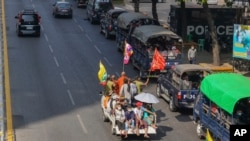Here is a timeline of some key events in Myanmar's recent turbulent history:
November 2015: The National League for Democracy (NLD) wins a general election by a landslide and Aung San Suu Kyi assumes power in a specially created role of state counselor.
October 2016: Rohingya militants attack three police border posts in Rakhine State, killing nine police officers. Myanmar's military then carries out a security operation, resulting in some 70,000 people leaving the area for neighboring Bangladesh.
August 2017: Rohingya militants launch attacks across Rakhine, triggering a military-led campaign that drives more than 730,000 Rohingya into Bangladesh. The United Nations says the campaign of mass killing, rape, and arson was carried out with "genocidal intent," which Myanmar denies.
January 2019: New fighting begins in Rakhine between government troops and the Arakan Army (AA), an insurgent group seeking greater regional autonomy that recruits from the mostly Buddhist Rakhine ethnic minority. Aung San Suu Kyi urges the army to "crush" the rebels.
December 2019: Aung San Suu Kyi appears at the International Court of Justice in the Hague and rejects accusations of genocide against the Rohingya as "incomplete and misleading" but says war crimes may have been committed.
September 2020: The government institutes coronavirus lockdown in Yangon and other areas but insists a Nov. 8 election will go ahead.
Sept. 22: Thomas Andrews, the U.N. human rights investigator to Myanmar, says polls will fail to meet international standards because of the disenfranchisement of hundreds of thousands of Rohingya.
Oct. 17: Myanmar's election commission cancels voting in vast swathes of Rakhine State, where fighting with the AA has killed dozens and displaced tens of thousands.
Nov. 3: Army chief Min Aung Hlaing says the civilian government is making "unacceptable mistakes" ahead of election, the second warning in two days about potential bias in the vote. Aung San Suu Kyi calls for calm in a Facebook post and urges voters not to be intimidated.
Nov. 9: The NLD claims a resounding victory in the parliamentary election.
Nov. 11: The main opposition, the military-backed Union Solidarity and Development Party (USDP), demands a re-run of the election and calls for military help to ensure fairness, alleging irregularities.
Nov. 13: The NLD said it would seek to form a government of national unity.
Jan. 26, 2021: Army military spokesman Brigadier General Zaw Min Tun warns it will "take action" if the election dispute is not settled and declined to rule out staging a coup.
Jan. 28: The election commission rejects allegations of vote fraud, saying there were no errors big enough to impact the credibility of the vote.
Jan. 30: Myanmar's military says it will protect and abide by the constitution and act according to law. Pro-military demonstrations are held in several major cities, including Yangon.
Feb. 1: Aung San Suu Kyi, President Win Myint and other senior figures from the ruling party are detained in an early morning raid. Mobile internet and some phone services are disrupted in Yangon. Military declares state of emergency and says it will rule for a year.





